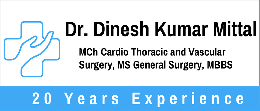Learn about the latest trends, expert insights, and engaging stories in our blog – a hub of information crafted to enrich your mind and inspire positive change.
Blog list
The human heart and lungs work tirelessly to keep us alive, pumping oxygen-rich blood throughout the body. However, when these vital organs face serious complications, timely medical intervention is essential. Cardiothoracic surgeons specialise in treating conditions related to the heart, lungs, and chest.
Research shows that timely intervention in cardiothoracic surgery can improve survival rates, with minimally invasive coronary artery bypass grafting showing a 96.1% survival rate over three years.
But how do you know when it’s time to see one? In this blog, we’ll discuss the key symptoms that indicate the need for a cardiothoracic consultation.
Who is a Cardiothoracic Surgeon?
A cardiothoracic surgeon is a highly specialised doctor who performs surgeries on the heart, lungs, esophagus, and other organs within the chest. They handle critical conditions like heart disease, lung cancer, and blocked arteries, among others, using both traditional and minimally invasive techniques.
While cardiologists focus on diagnosing and managing heart conditions with medications and lifestyle changes, cardiothoracic surgeons step in when surgery is needed for more advanced or complex issues. Essentially, cardiologists manage heart health through non-surgical means, while cardiothoracic surgeons perform surgery to provide solutions when the stakes are higher.
What are the Key Symptoms that Require a Consultation with a Cardiothoracic Surgeon?
Several key indicators can signal when it’s time to consult a cardiothoracic surgeon. Recognising these signs of heart and lung problems is essential for timely intervention and appropriate care.
- Persistent Chest Pain – Ongoing or radiating chest pain may indicate blocked arteries, heart disease, or an aortic aneurysm.
- Shortness of Breath – Difficulty breathing, even at rest or with minimal exertion, could signal heart failure, lung disease, or valve dysfunction.
- Irregular Heartbeat – Frequent palpitations, rapid or slow heartbeats, and dizziness may indicate arrhythmia or structural heart issues.
- Severe Fatigue – Unexplained tiredness and weakness could be due to reduced blood flow from heart valve disease or coronary artery disease.
- Swelling in Legs & Abdomen – Fluid retention in the lower body or abdomen may be a sign of heart failure or poor circulation.
- Uncontrolled High Blood Pressure – Resistant hypertension that doesn’t respond to medication may point to narrowed arteries or aneurysms.
- Frequent Lung Infections – Recurrent pneumonia, chronic cough, or coughing up blood could indicate lung disease or fluid buildup from heart failure.
- Worsening Heart/Lung Disease – If an existing heart or lung condition worsens with symptoms like chest pain or breathlessness, surgical treatment may be needed.
- Unexplained Weight Loss – Sudden weight loss, loss of appetite, and fatigue could be warning signs of severe heart or lung conditions.
- Issues After Heart Surgery – If symptoms like chest pain, shortness of breath, or fatigue return after surgery or stent placement, further evaluation is necessary.
Dr. Dinesh Mittal says, “These symptoms aren’t just a signal—they’re a call for action. The sooner we catch these warning signs, the better equipped we are to stop the problem from escalating.”
What are Some Common Conditions that Require Surgery?
Several heart and lung conditions may require surgical intervention when conservative treatments are insufficient. Some of the most common ones include:
- Coronary Artery Disease & Bypass Surgery
Coronary artery disease occurs when the arteries supplying blood to the heart become narrowed or blocked, potentially leading to a heart attack. If lifestyle changes and medications fail, coronary artery bypass grafting (CABG) surgery may be necessary to restore proper blood flow. - Heart Valve Disorders & Valve Replacement
Damaged or malfunctioning heart valves can cause symptoms like shortness of breath and fatigue. In cases of severe valve disease, valve replacement or repair surgery is essential to restore normal heart function. - Lung Cancer & Lung Surgery
Lung cancer may require surgical resection to remove tumors and improve survival rates. Depending on the stage and location of the tumour, a portion of the lung may need to be removed, often followed by chemotherapy or radiation. - Esophageal Cancer & GERD-related Surgery
Severe cases of gastroesophageal reflux disease (GERD) or esophageal cancer may require surgical interventions, such as esophagectomy, to remove damaged tissue or prevent further complications. - Congenital Heart Defects & Repair Surgery
Children or adults with congenital heart defects may require surgery to correct abnormalities such as a hole in the heart or abnormal valve function to ensure proper blood circulation and prevent future complications.
A patient of Dr. Dinesh who underwent aortic valve replacement explained: “Before surgery, I struggled just to walk to the local shop without feeling winded and exhausted. The operation was a success, and the care I received afterward was incredible. Now, weeks later, I can walk the dogs and do things around the house without any trouble.”
How to Prepare for a Consultation?
There are various important aspects you should consider before going for a consultation. Some of them are:
- List Symptoms and Medical History: Be ready to discuss your symptoms, medical history, and any treatments you’ve already tried.
- Prepare Questions About Treatment Options: Write down questions you have regarding surgery, recovery, and alternatives.
- Know About Diagnostic Tests: Familiarise yourself with standard tests like ECGs, angiography, and CT scans, as these may be required to diagnose your condition.
A patient of Dr. Dinesh shared: “I’m incredibly grateful to Dr. Mittal for his expert care and guidance. After surgery, my breathing improved, and I feel more energetic thanks to his advice and the recommended exercises. Thank you, Dr. Mittal, for giving me a new lease on life!”
Conclusion
Ignoring early symptoms of heart and lung disease can lead to severe complications, including heart failure, stroke, or sudden cardiac arrest. If you or a loved one experiences any of the symptoms mentioned above, do not hesitate to consult a cardiothoracic surgeon.
Early diagnosis and timely medical intervention can improve treatment outcomes and enhance the quality of life. If you have concerns about your heart or lung health, schedule a consultation with a specialist today.
FAQs
1. Is Cardiothoracic Surgery Always Necessary?
No, heart and lung conditions can often be managed through lifestyle adjustments and medication. Surgery becomes necessary in more serious cases.
2. What are the Associated Risks with Cardiothoracic Surgery?
As with any surgical procedure, cardiothoracic surgery carries potential risks, such as bleeding and infection. It is crucial to discuss these openly with your medical professional before making any decisions.
3. What is the Typical Cost of Cardiothoracic Surgery?
The cost of cardiothoracic surgery in India averages around ₹3,55,000. However, this can vary depending on the specific procedure, the hospital, and your insurance coverage. Discuss potential costs with your surgeon’s office and your insurance provider.
4. Can I Live a Normal Life After Cardiothoracic Surgery?
Many patients can return to a normal life after cardiothoracic surgery. While some lifestyle adjustments may be necessary, successful surgery can significantly improve quality of life and allow you to resume most of your usual activities. Your surgeon will provide specific guidance based on your individual situation.
5. How Do I Find a Qualified Cardiothoracic Surgeon?
Seek a referral from your doctor or contact your local medical board to find a well-qualified cardiothoracic surgeon. Always check for board certification and experience in the specific procedure you may require.
Explore more blogs: Top 5 Early Signs of Cardiovascular Diseases Everyone Should Know
Copyright by www.drdineshkumarmittal.com 2024. All rights reserved.
Copyright by BoldThemes 2018. All rights reserved.


